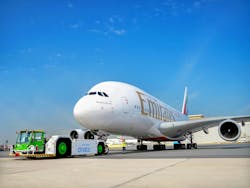dnata Announces Significant Sustainability Progress and Calls for Greater Collaboration from Infrastructure Providers
On World Environment Day, dnata, a leading global air and travel services provider, announced highlight results over the past 12 months as part of its ongoing sustainability strategy. For its airport operations, travel and catering businesses, dnata has cut the carbon intensity of its operations by over 8%, 22% and 26% respectively, and diverted waste from landfill across its global operations by up to 65%.
As a result of its consistent investments in renewable infrastructure, equipment, training and alternative fuel options, the company achieved significant improvements across key environmental performance metrics in the recently ended financial year.
“It’s encouraging to see the tangible impact of our global investments and initiatives on our environmental performance,” Steve Allen, CEO of dnata Group, said.
“While we keep a laser focus on sustainability in every decision we make, we recognise that achieving meaningful results requires a collective effort and flexible approach from multiple stakeholders. In some cases, the availability of alternative fuels such as electric and biofuels is moving slower than we would like. We will continue to actively engage with our partners to explore and implement practical solutions that enable us to replace energy sources with lower carbon alternatives and minimise waste sent to landfills.”
Significant Improvements Across Key Performance Metrics
dnata’s ground handling, cargo, travel, and catering and retail businesses measure direct and indirect emissions related to the number of flight turnarounds and revenue to enable comparison and year-on-year improvement.
In the financial year 2023-24, dnata’s environmental data has been externally verified by Verifavia. dnata’s carbon intensity measured in kilograms of CO₂ equivalent emissions per aircraft turnaround has reduced by 8.4% for its ground handling and cargo businesses. Meanwhile, its carbon intensity measured in grams of CO₂ equivalent emissions compared to revenue for catering and travel businesses has reduced by 26.3% and 22.5%, respectively.
Furthermore, the company diverted 65% of waste from landfill across its operations globally.
Investing in Renewable Energy
dnata minimises emissions across its businesses using renewable energy where available, and in some markets, such as the UK and Ireland, it exclusively procures solar and wind energy. Most recently, it has installed solar panels across several facilities in Pakistan and the Philippines to avoid consuming fossil-fuel powered electricity across several facilities.
Transforming Fleet
dnata also consistently invests in its modern fleet to improve environmental efficiency. Its fleet strategy commits to phasing out diesel-operated engines and switching to hybrid, electric, or hydrogen wherever airports have provided the necessary infrastructure. As a result of its investments in recent years, 65% of dnata’s fleet is now electric in the Netherlands, 44% in Italy, 40% in the UK, and 39% in Switzerland.
Minimizing Fuel Consumption with the Latest Technologies and Training
dnata maintains a strong focus on minimising fuel consumption. It monitors the consumption of fuel across its fleet of ground support equipment (GSE) using Vehicle Tracking Management systems; conducts logistics mapping exercises to ensure minimal distances are travelled airside; and optimises shifts and parking slots to avoid excessive fuel burn.
In addition, it tracks the behaviour of drivers, including idling times, and has key performance indicators linked to the environmental management system. dnata promotes more responsible driver behaviour through education, awareness and training.
Engaging with Alternative Fuel Suppliers
dnata actively engages with biofuel suppliers to reduce emissions. Several of dnata’s businesses have already deployed low carbon alternatives to replace diesel: in Schiphol airport, it has replaced over 674,000 litres with hydrotreated vegetable oil (HVO100) in the previous financial year.
Besides, the company now uses a blend of biofuel across its landside fleets in dnata logistics, City Sightseeing Tours, Arabian Adventures, and Alpha Flight Services in the UAE. This transition to biofuel has contributed to emissions reductions of about 2,200 tonnes of CO₂ over the lifecycle of the fuel.
Reducing Waste to Landfill
dnata actively minimises waste across its operations through consistent initiatives. Its catering and retail teams are working closely with many of its airline customers to analyse consumption trends and use predictive data to optimise the loading of F&B for in-flight catering. Analysis of on-board data not only reduces food waste but also fuel burn associated with carrying excess weight.
dnata has also taken further initiatives across its business units to recycle materials. Its cargo businesses have implemented circular economy principles to repurpose plastics into materials for other industries. Meanwhile, several of its catering businesses eliminated single-use plastics across their operations.
IATA’s IEnvA Certification
In September 2023, dnata became the first combined air services provider to receive the International Air Transport Association’ (IATA) environmental management certification as a recognition of its unwavering commitment to sustainability across its diverse portfolio of businesses in the United Arab Emirates (UAE).
